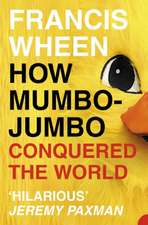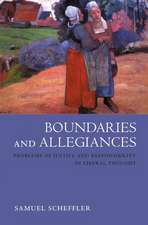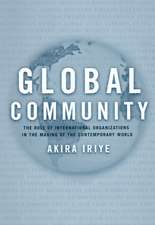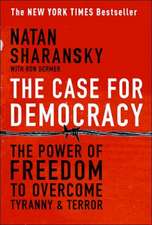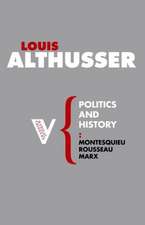Hannah Arendt and the Politics of Friendship
Autor Professor Jon Nixonen Limba Engleză Paperback – 28 ian 2015
| Toate formatele și edițiile | Preț | Express |
|---|---|---|
| Paperback (1) | 192.30 lei 6-8 săpt. | |
| Bloomsbury Publishing – 28 ian 2015 | 192.30 lei 6-8 săpt. | |
| Hardback (1) | 656.54 lei 6-8 săpt. | |
| Bloomsbury Publishing – 28 ian 2015 | 656.54 lei 6-8 săpt. |
Preț: 192.30 lei
Preț vechi: 223.15 lei
-14% Nou
Puncte Express: 288
Preț estimativ în valută:
36.79€ • 38.42$ • 30.39£
36.79€ • 38.42$ • 30.39£
Carte tipărită la comandă
Livrare economică 15-29 aprilie
Preluare comenzi: 021 569.72.76
Specificații
ISBN-13: 9781472513175
ISBN-10: 1472513177
Pagini: 232
Dimensiuni: 156 x 234 x 17 mm
Greutate: 0.39 kg
Editura: Bloomsbury Publishing
Colecția Bloomsbury Academic
Locul publicării:London, United Kingdom
ISBN-10: 1472513177
Pagini: 232
Dimensiuni: 156 x 234 x 17 mm
Greutate: 0.39 kg
Editura: Bloomsbury Publishing
Colecția Bloomsbury Academic
Locul publicării:London, United Kingdom
Caracteristici
An original study of a key dimension of Arendt's thinking - the notion of friendship
Notă biografică
Jon Nixon is Honorary Professor at The Education University of Hong Kong, Hong Kong. He has held chairs at four universities across the UK.
Cuprins
Preface and Acknowledgements Chapter 1 A child of the time Chapter 2 Friendship and plurality Chapter 3 Friendship as promise Chapter 4 Arendt and Heidegger: the struggle for friendship Chapter 5 Arendt and Jaspers: becoming worldly Chapter 6 Arendt and McCarthy: becoming our selves Chapter 7 Arendt and Blücher: flourishing together Chapter 8 The hermeneutics of friendship Chapter 9 The republic of friendship Epilogue: A woman of the world Appendix: Outline chronology of Arendt's life and works ReferencesIndex
Recenzii
[Nixon's] theoretical discussions of Arendt's work are concise and well formulated ... The book is very accessible and clearly written ... [and] is a great place to start thinking about Arendt and her times.
Nixon offers an engaging overview of Arendt's life and works ... For any scholar or student interested in learning about Arendt this book will serve as an excellent point of entry.
Hannah Arendt and the Politics of Friendship provides a profound and discerning perspective on the genesis of Arendt's thinking, one which will satisfy both the scholarly community as well as appealing to the broader public.
[An] engaging biography ... Nixon depicts Arendt as a role model, in friendship if nothing else ... [and he] gestures at the lesson we can all take away from her complex, well-examined, ultimately exasperating life: that without genuine, long-lasting friendships, made up of equal parts loyalty and affection and mischievousness and shared struggle, we are entirely alone in the world.
We are all custodians of other people's ideas: we read, we think and we deploy. Jon Nixon has produced just such a text about Arendtian thinking and practice regarding friendship that illuminates how her major contributions to politics took place within and for friendships. We think and act in a social context, and Arendt talked about politics as action, and Nixon shows how she acted as a friend. She learned and others learned through this process. Nixon has produced a remarkable and vibrant account: this is a deeply respectful and illuminating text. It is a major resource for Arendtian scholars: it will be delved into, read, used, and thought about.
In this rich and thoroughly compelling book, Jon Nixon presents a fascinating, eloquent and inspiring account of the centrality of friendship and politics to Arendt's life as well as her thought. This book is a pure pleasure to read.
In his newest book Jon Nixon provides a profound analysis of Hannah Arendt's notion of friendship as it relates to her conception of politics. Uniting Arendt's life and work, the author presents an engaging defence of participatory democracy and its building blocks, deliberation and reciprocity.
Jon Nixon's forensic examination of friendship through the life and work of Hannah Arendt demonstrates the importance of historical context in understanding ideas and actions. The combination of a fascinating subject and elegant, profound writing makes this book a joy to read.
Though friendship as a condition for human existence seems to gain increasing attention both in the mass and social media, and by scholars from the humanities, our modern notion of friendship as a private or intimate relation still dominates. Jon Nixon's insightful study of the friendships of Hannah Arendt and her political thinking is a long needed correction to this view. Nixon demonstrates how and why Arendt developed not a 'philosophy of friendship' but a practical and reflexive politics of friendship. She lived and was sustained by the friendships she maintained throughout her life with a plurality of individuals, the closest whom we come to know through Nixon's careful analysis of Arendt's close relationships with Heidegger 'the fox' as she called him, with philosopher and psychiatrist Karl Jaspers, author and critic Mary McCarthy, and with her second husband Heinrich Blucher, an activist and educator. Arendt's political thinking was tightly connected, Nixon shows, to her idea of the essential role of friendship in non-totalitarian societies to bridge the public and the private: Friendship, recognising both equality and differences, is allied to politics, not as a way of doing it, but as a condition necessary for the survival of a politics that Arendt envisions as a mutual dialogical understanding that exists between friends and that forms the moral bases of political action. Nixon timely combines historical context, political thinking, and a discerning understanding of Arendt the person to come up with a captivating story about the life of one of the great minds of the twentieth century, and new beginning for thinking about the politics of friendship.
Nixon offers an engaging overview of Arendt's life and works ... For any scholar or student interested in learning about Arendt this book will serve as an excellent point of entry.
Hannah Arendt and the Politics of Friendship provides a profound and discerning perspective on the genesis of Arendt's thinking, one which will satisfy both the scholarly community as well as appealing to the broader public.
[An] engaging biography ... Nixon depicts Arendt as a role model, in friendship if nothing else ... [and he] gestures at the lesson we can all take away from her complex, well-examined, ultimately exasperating life: that without genuine, long-lasting friendships, made up of equal parts loyalty and affection and mischievousness and shared struggle, we are entirely alone in the world.
We are all custodians of other people's ideas: we read, we think and we deploy. Jon Nixon has produced just such a text about Arendtian thinking and practice regarding friendship that illuminates how her major contributions to politics took place within and for friendships. We think and act in a social context, and Arendt talked about politics as action, and Nixon shows how she acted as a friend. She learned and others learned through this process. Nixon has produced a remarkable and vibrant account: this is a deeply respectful and illuminating text. It is a major resource for Arendtian scholars: it will be delved into, read, used, and thought about.
In this rich and thoroughly compelling book, Jon Nixon presents a fascinating, eloquent and inspiring account of the centrality of friendship and politics to Arendt's life as well as her thought. This book is a pure pleasure to read.
In his newest book Jon Nixon provides a profound analysis of Hannah Arendt's notion of friendship as it relates to her conception of politics. Uniting Arendt's life and work, the author presents an engaging defence of participatory democracy and its building blocks, deliberation and reciprocity.
Jon Nixon's forensic examination of friendship through the life and work of Hannah Arendt demonstrates the importance of historical context in understanding ideas and actions. The combination of a fascinating subject and elegant, profound writing makes this book a joy to read.
Though friendship as a condition for human existence seems to gain increasing attention both in the mass and social media, and by scholars from the humanities, our modern notion of friendship as a private or intimate relation still dominates. Jon Nixon's insightful study of the friendships of Hannah Arendt and her political thinking is a long needed correction to this view. Nixon demonstrates how and why Arendt developed not a 'philosophy of friendship' but a practical and reflexive politics of friendship. She lived and was sustained by the friendships she maintained throughout her life with a plurality of individuals, the closest whom we come to know through Nixon's careful analysis of Arendt's close relationships with Heidegger 'the fox' as she called him, with philosopher and psychiatrist Karl Jaspers, author and critic Mary McCarthy, and with her second husband Heinrich Blucher, an activist and educator. Arendt's political thinking was tightly connected, Nixon shows, to her idea of the essential role of friendship in non-totalitarian societies to bridge the public and the private: Friendship, recognising both equality and differences, is allied to politics, not as a way of doing it, but as a condition necessary for the survival of a politics that Arendt envisions as a mutual dialogical understanding that exists between friends and that forms the moral bases of political action. Nixon timely combines historical context, political thinking, and a discerning understanding of Arendt the person to come up with a captivating story about the life of one of the great minds of the twentieth century, and new beginning for thinking about the politics of friendship.

